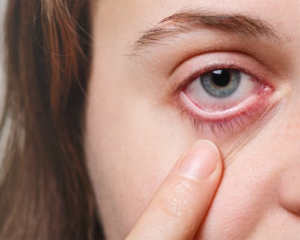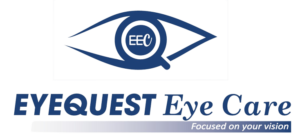
Dry Eyes
Dry Eye refers to a condition that results due to inadequate or ineffective wetting and lubrication of the eye. It primarily occurs due to reduction in quality or quantity of the tears and tear film. With increase in the use of computers, this condition is becoming more prevalent and is known by the name of Computer Vision Syndrome
Why Choose EYEQUEST Eye Care

1. Expertise You Can Trust
Our team of skilled optometrists and ophthalmologists boasts years of experience in managing and treating dry eyes. Rest assured, your eyes are in capable hands.

2. Holistic Approach
We don't just treat the symptoms; we aim for a holistic improvement in your eye health. Our treatments not only relieve your discomfort but also enhance the overall well-being of your eyes.

3. Convenient Locations
EYEQUEST Eye Care ensures that you have easy access to our services. Your journey to healthy eyes is just around the corner.

Your Vision is Our Priority
At EYEQUEST Eye Care, we believe that your vision deserves the best care possible. Our comprehensive eye checkup services are designed to ensure that your eyes remain healthy and your vision stays sharp. Don't wait until you notice a problem; regular checkups are essential for maintaining good eye health.
What are the symptoms of Dry Eye?
Dry eye commonly presents as the following problems:
- Burning sensation in the eyes
- Grittiness & foreign body like feeling in the eye
- Irritation in the form of itching & stinging
- Redness of the eye
- Sensitivity to light
- Blurred vision that improves on blinking
- Excess watering of the eye
- Mucus discharge from the eye
- Increased eye discomfort on reading, watching TV, sewing, working on a computer etc.
Are there any known causes for Dry Eye?
Causes for dry eye can be broadly categorised as follows:
- Natural Ageing Process – as we grow older, there is a reduction in the production of natural tears and their effectiveness.
- Environmental Conditions – such as hot, dry or windy climate, air pollution, air conditioning, dusty or smoky atmosphere, over heated rooms etc.
- Occupational – working on computers for long periods of time, results in less blinking thus leading to eye strain and dry eye.
- Systemic Diseases – such as Sjogren’s Syndrome, Rheumatoid Arthritis, Systemic Sclerosis, Thyroid conditions, Steven Johnson Syndrome.
- Hormonal Changes – like during menopause.
- Medication Side Effects – diuretics, antihistamines, anti depressants, antimuscarinics are known to cause dry eye.
- Vitamin A Deficiency
- Prolonged Contact Lens use
- Radiation Therapy of the head and neck
- Refractive Eye Surgery such as LASIK and PRK
- Eye Trauma
- Infections and certain eye diseases such as Blepharitis.
- Personal habits such as smoking, reduced blinking thus leading to excess tear evaporation etc.
- Meibomian gland dysfunction (MGD)
What is Meibomian Gland dysfunction?
MGD occurs when the tiny Meibomian glands in eyelids become blocked and are unable to secrete lipid layer of the tear film - a thin layer that covers the outer surface of the tear film and prevents its evaporation. Anyone can get MGD, but some are more prone for it than others. Contact lens wearers, heavy users of personal electronic devices are at higher risk because of much lower blink rate. Postmenopausal women are also at higher risk for MGD
How is MGD diagnosed?
A thorough clinical examination with the help of some special tests to evaluate the Ocular Surface and Tear Film and Meibography (photography of Meibomian Glands) can help the doctor diagnose and assess the severity of MGD. This helps in customizing the treatment to the exact disease process and maximizing benefits of the treatment.
What is the management of dry eye?
- Avoid being in dry atmosphere for long periods of time. If you have to, use a humidifier.
- Avoid direct blast of heaters and air conditioners at face level.
- Sit away from direct heat such as furnace fires, gas etc.
- Use lubricating eye drops such as artificial tears.
- Make a conscious effort to blink regularly with full lid closure and not ‘half blinks’
- Avoid smoky atmosphere
- Drink 8-10 glasses of water daily
- Avoid smoking
- Use wrap around glasses and sunglasses when outdoors.
- In order to relieve acute episodes, use periodic cold, moist compresses to decrease burning & itching.
- In MGD or Meibomian Gland Disease, the management is to try to clear the blockage by doing hot fomentation and lid massage. Some special Eye Pads may be used to facilitate adequate hot fomentation of the eyes. Often this home treatment is not effective enough and these patients may need treatment with the help of some special devices like LipiFlow or IPL (Intense Pulsed Light).
What is the effect of computers on the eye?
Eye strain has been reported with most extensive computer users. Also referred to as Computer Vision Syndrome or Computer Stress Syndrome, it involves the manifestation of a variety of symptoms such as eye strain, headache, and some times it may be indicated by indirect symptoms such as neck, shoulder back and wrist pains, general fatigue and decreased visual efficiency.
